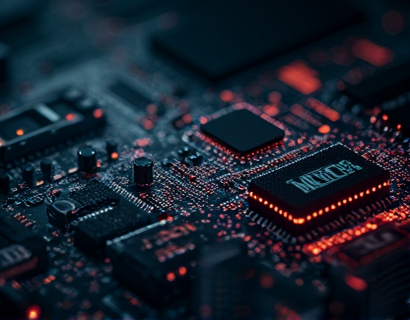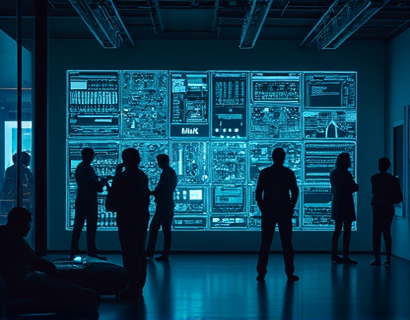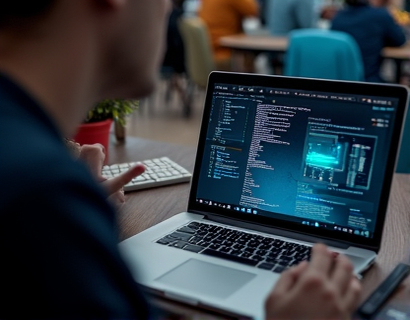Crypto-Powered AI Solutions: The Future of Enhanced Productivity in the Digital Age
The intersection of cryptocurrency and artificial intelligence (AI) is giving rise to a new era of productivity tools that are redefining how we approach tasks in the digital age. This article delves into the innovative ways these technologies are combining to create decentralized applications that streamline workflows, enhance efficiency, and offer unprecedented levels of security and transparency. For tech enthusiasts, AI aficionados, and professionals looking to leverage the next generation of digital solutions, understanding these crypto-powered AI tools is crucial.
Understanding Crypto-Powered AI
Crypto-powered AI solutions integrate blockchain technology with machine learning algorithms to create systems that are not only intelligent but also decentralized and secure. Blockchain's inherent properties, such as immutability and transparency, ensure that data used in AI models is tamper-proof and verifiable. This synergy between crypto and AI fosters trust and reliability in the data-driven decisions made by these systems.
Enhanced Data Security and Privacy
One of the most significant advantages of crypto-powered AI solutions is the enhanced security and privacy they offer. Traditional AI systems often rely on centralized data repositories, making them vulnerable to breaches and misuse. In contrast, blockchain-based systems distribute data across a network of nodes, reducing the risk of a single point of failure. Smart contracts, self-executing contracts with the terms directly written into code, can automate and secure data transactions, ensuring that privacy is maintained while data is shared and utilized for AI processes.
Decentralized Data Marketplaces
Crypto-powered AI solutions are enabling the creation of decentralized data marketplaces where data owners can monetize their data directly. These platforms use blockchain to facilitate secure and transparent data transactions, allowing users to control who accesses their data and for what purpose. This shift empowers individuals and organizations to leverage their data for AI training and other applications, while maintaining ownership and receiving fair compensation. For instance, a decentralized data marketplace can connect data providers with AI model developers, ensuring that data is used ethically and efficiently.
Case Study: Decentralized Data Platforms
Platforms like DataChain and SecureData are pioneering the way in decentralized data marketplaces. DataChain uses blockchain to create a secure and transparent environment where users can sell their data to AI developers. Each data transaction is recorded on the blockchain, providing a verifiable trail of consent and compensation. SecureData, on the other hand, focuses on health data, allowing patients to control and monetize their medical records while ensuring that healthcare providers have access to accurate and up-to-date information for better diagnostics and treatment plans.
Improved Efficiency and Automation
AI, powered by crypto, is revolutionizing automation by creating more efficient and reliable systems. Smart contracts can automate complex business processes, reducing the need for intermediaries and minimizing human error. For example, in supply chain management, AI-driven smart contracts can track the movement of goods in real-time, ensuring that each step is verified and recorded on the blockchain. This not only speeds up the process but also enhances transparency and accountability.
Smart Contracts in Business Processes
Smart contracts are programmable agreements that execute automatically when predefined conditions are met. In the context of crypto-powered AI, these contracts can manage a wide range of business operations, from payment processing to inventory management. For instance, a smart contract can be set up to release payment to a supplier once the goods have been delivered and verified by a smart sensor. This reduces the need for manual checks and speeds up the entire process, leading to significant cost savings and increased efficiency.
Enhanced Collaboration and Trust
The decentralized nature of crypto-powered AI solutions fosters greater collaboration and trust among participants. In traditional centralized systems, trust is often placed in a single entity, which can be a point of failure. Blockchain-based systems distribute trust across the network, ensuring that all participants can verify transactions and processes independently. This peer-to-peer trust model is particularly beneficial in industries where collaboration is key, such as finance, logistics, and supply chain management.
Cross-Industry Collaboration
Crypto-powered AI is breaking down silos across industries by enabling seamless collaboration. For example, in the finance sector, banks and financial institutions can use blockchain to share transaction data securely, improving credit scoring models and fraud detection systems. In logistics, shipping companies can collaborate on real-time tracking and verification of shipments, reducing delays and enhancing customer satisfaction. These collaborative efforts, facilitated by AI and blockchain, lead to more efficient and trustworthy operations.
Scalability and Flexibility
One of the key benefits of crypto-powered AI solutions is their scalability and flexibility. Blockchain networks can handle a large volume of transactions and can be easily scaled to accommodate growing demands. AI models can be trained on vast datasets, improving their accuracy and performance over time. This combination ensures that the solutions remain relevant and effective as the digital landscape evolves.
Scalable AI Models
Scalable AI models are essential for handling the increasing amount of data generated daily. Crypto-powered AI platforms can leverage distributed computing resources to train and deploy models at scale. For instance, a decentralized AI platform can aggregate computing power from multiple nodes to train complex models, such as natural language processing (NLP) or computer vision algorithms, without the need for expensive centralized infrastructure. This not only reduces costs but also accelerates the development and deployment of AI solutions.
User-Centric Design and Accessibility
The design of crypto-powered AI solutions is increasingly focused on user experience and accessibility. These platforms aim to make advanced technologies accessible to a broader audience, including those without deep technical expertise. User-friendly interfaces and intuitive tools ensure that individuals and businesses can leverage these technologies to enhance their productivity without needing to be AI or blockchain experts.
User-Friendly Interfaces
Platforms like EasyAI and BlockchainAssistant are leading the way in user-centric design. EasyAI provides a simple dashboard where users can manage their AI models, monitor performance, and integrate with existing workflows with minimal setup. BlockchainAssistant offers guided tutorials and support to help users understand and utilize blockchain-based tools, making the transition to decentralized solutions smoother and more accessible.
Challenges and Considerations
While the potential of crypto-powered AI solutions is vast, there are several challenges and considerations that need to be addressed. Scalability, regulatory compliance, and user education are key areas that require ongoing attention and innovation.
Scalability Challenges
As the adoption of blockchain and AI grows, scalability remains a significant challenge. Blockchain networks must handle increasing transaction volumes without compromising speed or security. Solutions like sharding, layer 2 protocols, and more efficient consensus mechanisms are being developed to address these issues. Additionally, integrating AI models with scalable blockchain solutions requires careful design to ensure that performance is not compromised.
Regulatory Landscape
The regulatory environment for crypto and AI is still evolving, and compliance is a critical consideration for developers and users alike. Ensuring that crypto-powered AI solutions adhere to local and international regulations is essential for widespread adoption. This includes data privacy laws, anti-money laundering (AML) regulations, and other industry-specific requirements. Platforms must stay informed and adapt to regulatory changes to maintain compliance and trust.
User Education
Educating users about the benefits and functionalities of crypto-powered AI solutions is crucial for their successful adoption. Many individuals and businesses are still unfamiliar with blockchain and AI technologies, which can hinder their willingness to embrace these tools. Providing comprehensive documentation, tutorials, and support can help bridge this knowledge gap and encourage more widespread use.
Future Prospects
The future of crypto-powered AI solutions is promising, with ongoing advancements in both technologies poised to create even more innovative and powerful tools. The integration of quantum computing, edge AI, and advanced cryptography will further enhance the capabilities of these systems, leading to new possibilities in productivity and efficiency.
Quantum AI Integration
Quantum computing, with its ability to process complex calculations at unprecedented speeds, has the potential to revolutionize AI. Crypto-powered AI solutions can leverage quantum computing to train models faster, handle larger datasets, and solve problems that are currently infeasible. This synergy could lead to breakthroughs in fields such as drug discovery, climate modeling, and financial forecasting.
Edge AI and Decentralization
Edge AI, which involves processing data closer to the source rather than in centralized data centers, aligns well with the decentralized nature of blockchain. By combining edge AI with crypto-powered AI solutions, data can be processed locally, reducing latency and bandwidth usage while maintaining security and privacy. This approach is particularly beneficial for IoT devices and real-time applications.
Conclusion
The convergence of crypto and AI is ushering in a new era of productivity tools that are more secure, efficient, and user-friendly. These crypto-powered AI solutions are transforming the way we work, collaborate, and manage data, offering significant benefits for tech enthusiasts, professionals, and businesses alike. As the technologies continue to evolve, the potential for innovation and improvement is vast, paving the way for a more decentralized and intelligent digital future.










































